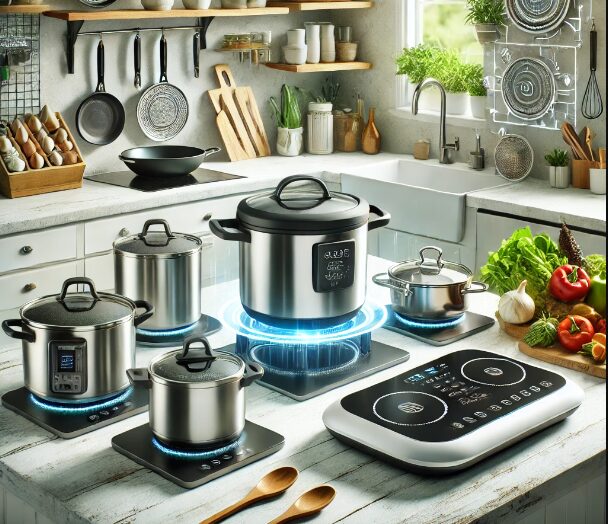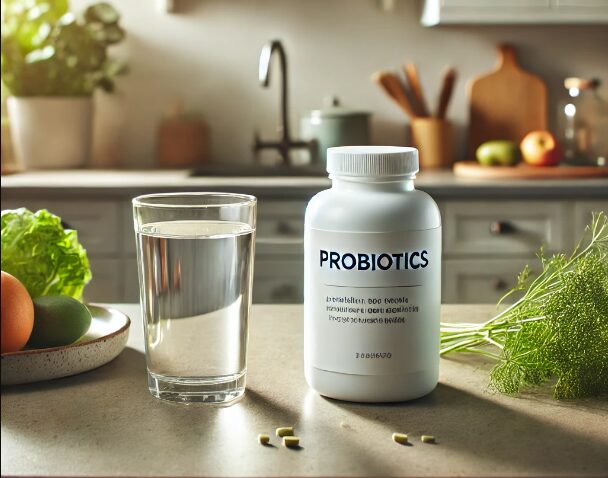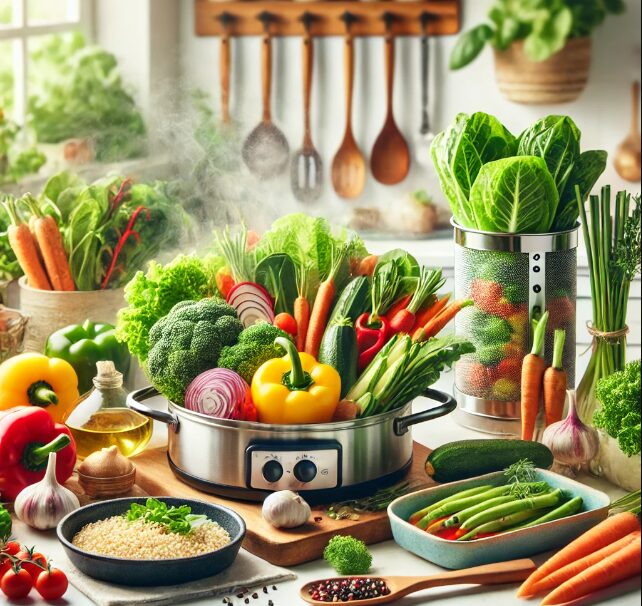Cooking is not just a daily chore—it’s an opportunity to invest in your health. With advancements in cookware technology, preparing nutritious meals has never been easier or more efficient. The cookware you choose plays a significant role in how your food retains nutrients, the cooking methods you use, and even the amount of harmful chemicals your meals could absorb. Innovative cookware is revolutionizing the way we think about home cooking, helping you to cook smarter while boosting your health. This guide will walk you through the best cookware technologies that not only improve the quality of your meals but also enhance your overall well-being.
Innovative Cookware for Healthier, Smarter Cooking
Whether you’re making a quick stir-fry or a slow-cooked stew, the cookware you use can significantly impact the nutritional value of your food. Let’s dive into some of the most cutting-edge cookware technologies that promote healthier cooking.
Non-Toxic Cookware Materials
In recent years, there has been a shift toward cookware made from non-toxic, eco-friendly materials. Traditional non-stick pans are often coated with substances like PFOA (perfluorooctanoic acid), which can release toxic fumes when overheated. Modern non-toxic options include ceramic, stainless steel, cast iron, and titanium. These materials are not only safer but also offer durability and versatility.
✓ Ceramic Cookware: Made from natural clay and free from harmful chemicals, ceramic cookware heats evenly and retains heat well, helping your food cook thoroughly without losing essential nutrients. It’s naturally non-stick, making it a great alternative to traditional Teflon.
✓ Stainless Steel: Stainless steel is highly durable and resistant to rust, making it a long-term investment in your kitchen. Unlike aluminum cookware, it doesn’t react with acidic foods, ensuring that your meals are free from metal contamination.
✓ Titanium Cookware: Titanium is lightweight, corrosion-resistant, and non-reactive, making it ideal for cooking a wide range of dishes. It’s especially great for people with allergies or sensitivities to certain metals found in cheaper cookware.
INSIDER TIPS: Discover the joy of healthy cooking with cookware from iCook™. Shop individual pieces or complete cookware sets that feature multi-ply stainless steel construction with a carbon-steel/aluminum core for even heat distribution. The perfect combination of healthy and easy! Please show me.
Advanced Temperature Control
Proper temperature control is critical for maintaining the nutritional integrity of your food. Overcooking vegetables or proteins can strip them of essential nutrients. Modern cookware technologies now feature smart temperature sensors that ensure you’re cooking at optimal levels. Brands like Amway offer cookware with multi-layered technology, which allows precise temperature management. This ensures that food cooks evenly and retains more of its vitamins and minerals.
✓ Smart Cookware with Built-In Sensors: Cookware with built-in temperature sensors and smart controls can alert you when the pan reaches the ideal temperature for different types of food, helping to prevent overcooking and undercooking. This technology is especially useful for maintaining the integrity of delicate ingredients like fish and leafy greens.
Multi-Layered Construction for Even Heating
Many of the latest cookware models utilize multi-layered designs that ensure even heating. This construction method involves sandwiching different metals, like aluminum or copper, between layers of stainless steel. This helps distribute heat evenly across the pan, reducing hot spots that can cause food to burn or cook unevenly. Cookware brands, including Amway’s iCook line, offer such technologies, designed to retain food’s natural flavors and nutrition through uniform heat distribution.
✓ Multi-Ply Stainless Steel: Featuring layers of stainless steel and aluminum, this design ensures even heating across the entire pan, which helps preserve the natural flavors of your ingredients. No more overcooked edges or undercooked centers!
Pressure Cooking for Nutrient Retention
Pressure cookers have evolved dramatically, becoming a go-to tool for health-conscious cooks. With smart pressure control settings, modern pressure cookers can cook food faster while retaining up to 90% of its nutrients. The shorter cooking times also mean that foods like vegetables retain their vibrant colors and textures.
✓ Smart Pressure Cookers: Equipped with multiple cooking modes and timers, smart pressure cookers are designed to handle everything from rice to complex stews. These devices are also energy-efficient and help reduce cooking times, locking in nutrients for healthier meals.
INSIDER TIPS: Discover the joy of healthy cooking with cookware from iCook™. Shop individual pieces or complete cookware sets that feature multi-ply stainless steel construction with a carbon-steel/aluminum core for even heat distribution. The perfect combination of healthy and easy! Please show me.
Steam Cooking Technology
Steam cooking is one of the healthiest ways to prepare food because it preserves the nutrients that are often lost during boiling or frying. Modern steamers now come with multi-functional capabilities, allowing you to cook an entire meal using only steam. These appliances are perfect for people who want to cut down on oil and fat while preserving the natural nutrients in their food.
✓ Stackable Steamers: With stackable designs, today’s steamers allow you to cook multiple items at once, making it easier to prepare balanced, nutrient-dense meals. Brands like Amway offer steam cookware sets that enable hassle-free preparation of vegetables, fish, and grains simultaneously.
Induction Cooktops for Precision Cooking
Induction cooking uses electromagnetic fields to heat cookware directly, offering a more energy-efficient and faster cooking method. It reduces the risk of burning food, as it allows for more precise control over cooking temperatures. Induction cooktops are also safer because they remain cool to the touch, reducing the likelihood of accidental burns.
✓ Induction-Ready Cookware: To use an induction cooktop, you’ll need induction-compatible cookware, typically made from ferrous materials like cast iron or magnetic stainless steel. With the combination of induction technology and proper cookware, you can enjoy faster cooking with better temperature control, ultimately improving the nutritional quality of your meals.
INSIDER TIPS: Discover the joy of healthy cooking with cookware from iCook™. Shop individual pieces or complete cookware sets that feature multi-ply stainless steel construction with a carbon-steel/aluminum core for even heat distribution. The perfect combination of healthy and easy! Please show me.
Quick Facts About Innovative Cookware for Healthier Cooking
▸ Ceramic cookware is naturally non-stick and free from harmful chemicals.
▸ Multi-layered cookware offers even heat distribution, preventing nutrient loss from overcooked food.
▸ Smart temperature sensors in cookware help maintain optimal cooking conditions, ensuring food retains its nutritional value.
▸ Pressure cooking can retain up to 90% of food’s nutrients, cooking meals quickly and healthily.
▸ Steam cooking eliminates the need for oils, allowing you to prepare low-fat, nutrient-dense meals.
▸ Induction cooking offers precise temperature control, reducing the risk of nutrient loss from overheating.
INSIDER TIPS: Discover the joy of healthy cooking with cookware from iCook™. Shop individual pieces or complete cookware sets that feature multi-ply stainless steel construction with a carbon-steel/aluminum core for even heat distribution. The perfect combination of healthy and easy! Please show me.
Q&A About Healthier Cooking with Innovative Cookware
✦ Q1: Why is ceramic cookware better than traditional non-stick pans?
Ceramic cookware is made from natural clay and doesn’t contain harmful chemicals like PFOA or PFTE, which can leach into food at high temperatures. It also offers excellent heat retention, allowing your food to cook evenly without overusing oil or butter.
✦ Q2: How does smart cookware with built-in sensors benefit my health?
Smart cookware ensures that your food cooks at the optimal temperature, preserving its natural nutrients. Overcooking food can destroy essential vitamins and minerals, and smart sensors help you avoid that.
✦ Q3: What makes pressure cooking healthier?
Pressure cooking uses steam and pressure to cook food quickly, which helps retain more vitamins and minerals compared to traditional cooking methods like boiling or frying.
✦ Q4: Are induction cooktops really better for cooking?
Yes! Induction cooktops offer precise temperature control, faster heating, and improved energy efficiency. This ensures food is cooked perfectly while retaining more nutrients.
✦ Q5: Can I use multi-layered cookware on all types of stoves?
Yes, multi-layered cookware is versatile and works on various cooktops, including gas, electric, and induction. Its even heating design ensures no nutrient loss from uneven cooking.
✦ Q6: Does steam cooking really preserve more nutrients?
Absolutely. Steam cooking doesn’t require oils or fats and uses lower temperatures than other cooking methods, which helps retain more nutrients, especially in vegetables.
✦ Q7: What are the environmental benefits of using eco-friendly cookware?
Eco-friendly cookware, like ceramic or stainless steel, is often made from sustainable materials and designed to last longer, reducing waste and the need for frequent replacements.
✦ Q8: How does titanium cookware compare to stainless steel?
Titanium cookware is lighter and more corrosion-resistant than stainless steel, making it a good choice for those who prefer non-reactive materials. However, both materials are durable and non-toxic.
✦ Q9: Do I need special cookware for an induction cooktop?
Yes, induction cooking requires ferrous materials like cast iron or stainless steel that are magnetically reactive. You can easily check if your cookware is induction-compatible by seeing if a magnet sticks to the bottom.
✦ Q10: Can innovative cookware improve my overall cooking experience?
Definitely! With features like non-stick surfaces, even heating, smart temperature control, and faster cooking times, innovative cookware makes cooking healthier, easier, and more enjoyable.
INSIDER TIPS: Discover the joy of healthy cooking with cookware from iCook™. Shop individual pieces or complete cookware sets that feature multi-ply stainless steel construction with a carbon-steel/aluminum core for even heat distribution. The perfect combination of healthy and easy! Please show me.
Conclusion
Innovative cookware technologies are transforming how we prepare meals, offering safer, healthier, and more efficient ways to cook. From non-toxic materials to smart temperature controls, these advancements make it easier to preserve the nutritional value of your food, while reducing harmful chemicals and excessive fats. By investing in the right cookware, you can take a major step toward boosting your health through smarter, more conscious cooking methods. Whether you’re using ceramic pans, smart pressure cookers, or induction cooktops, the future of healthier cooking is already here—ready for you to explore.
Discover the joy of healthy cooking with cookware from iCook™. Shop individual pieces or complete cookware sets that feature multi-ply stainless steel construction with a carbon-steel/aluminum core for even heat distribution. The perfect combination of healthy and easy!
Recommended reading for Top Healthy Cooking Tips:
“Top Healthy Cooking Tips: How to Maximize Nutrient Retention in Meals“(Read Time: 6 Minutes)
You can visit the NIH for extended Knowledge and Understanding of Dietary Supplements.





[…] “Boost Your Health: Innovative Cookware for Smarter, Healthier Cooking“(Read Time: 10 Minutes) […]